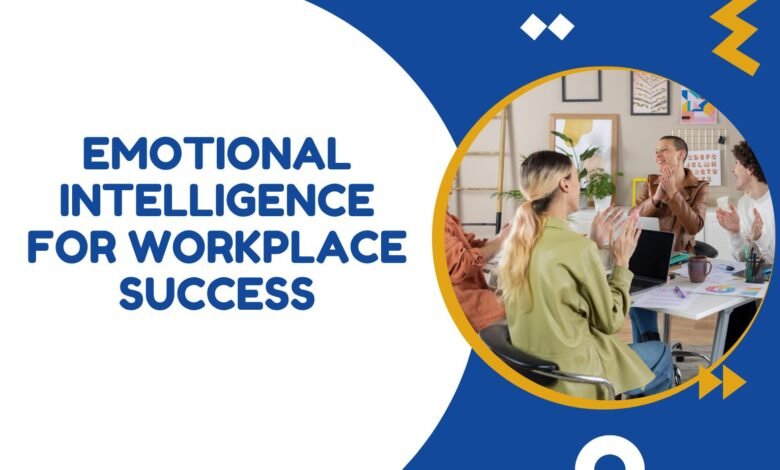Mastering Emotional Intelligence for Workplace Success
Enhancing Emotional Intelligence for Workplace Success

Within the workplace, Emotional Intelligence is vital for creating a positive atmosphere and forming strong connections among colleagues. It nurtures a supportive environment for effective collaboration. Effective leaders harness their emotional intelligence skills to navigate stressful situations gracefully and with composure. Mastering emotional intelligence for workplace success involves honing these abilities to enhance communication, resolve conflicts, and promote overall happiness among team members. By prioritizing EI development, professionals can unlock new levels of career achievement and fulfillment.
Understanding Emotional Intelligence
Emotional intelligence, pivotal for workplace success, comprises several key components crucial in professional settings. Understanding oneself, particularly in the context of emotional intelligence for workplace success, involves realizing and grasping one’s feelings and how they impact what one does and chooses. This insight fosters better interpersonal skills and positive relationships with colleagues and clients. In high-pressure situations, self-aware individuals maintain composure and make sound judgments.
Secondly, self-regulation involves managing emotions effectively steering clear of impulsive reactions. This skill enables professionals to handle stress and setbacks resiliently, leading to improved job performance and financial success. Moreover, motivation, another vital component, drives individuals to set and achieve goals persistently. Motivated employees inspire teams and contribute to a positive work environment.
Understanding how others feel, called empathy, is super important. It helps us connect better with people and make stronger bonds. When we show empathy, we make others feel heard and understood. This allows teams to work well together and solve problems. Being good at communication and solving conflicts is also part of social skills.
They help us handle different situations at work and make everyone feel included and respected. Improving your understanding and managing emotions means thinking, getting feedback, and practicing specific skills. When people prioritize emotional intelligence for workplace success and work on these things, they can improve their jobs and build strong work relationships.
Applying Emotional Intelligence for Workplace Success
Mastering emotional intelligence is essential at work nowadays. It helps you succeed and make the environment better. At Hatchproof, we understand the significance of this skill in driving workplace dynamics. Communication and understanding others are super important at work and with clients.
Knowing how others feel and see things, we can handle problems better and find reasonable solutions. Establishing good connections forms the basis of a happy workplace vibe. When people show they understand feelings, they build faith and closeness, crucial for working together and getting stuff done.
Integrating emotional intelligence for workplace success training into the four phases of employee development can notably boost social skills and awareness. This, in turn, boosts career success and strengthens team dynamics. Intelligent employees, armed with high emotional intelligence and technical prowess, contribute positively to the overall ethos of the organization.
Human resources departments recognize the intrinsic value of fostering emotional intelligence in employees. Focusing on more than just IQ, we highlight how social skills and motivation matter. By valuing emotional smarts, businesses can make a place where people do well and work together for goals.
Developing Emotional Resilience
In navigating workplace challenges, emotional resilience stands as a cornerstone. Amidst stress and pressure, fostering a positive mindset is vital. Understanding emotions and empathizing with others cultivates meaningful connections. This enables intelligent employees to balance emotions and rationality in decision-making, a critical component of workplace success.
Effective communication and social awareness further enhance employability skills. While external rewards may motivate, internal emotional skills have a lasting positive impact. Mastering emotional intelligence for workplace success empowers individuals to thrive amidst professional demands.
- Try deep breathing or meditation to relax.
- Manage time well to avoid feeling overwhelmed.
- Balance work and personal life, and do things you enjoy.
- Talk to friends or a counselor if stressed.
- Be realistic with goals and share tasks when possible.
- Take breaks during work to rest.
- Deal with things causing stress at work.
- Exercise, eat well, and sleep enough for a healthy life.
Cultivating a Positive Work Environment
In cultivating a positive work environment, fostering emotional intelligence is vital. Encouraging open communication and constructive feedback builds trust and collaboration among team members. Recognizing emotional intelligence in action celebrates strengths and encourages professional development. Leaders enhance employee engagement and productivity by promoting inclusivity and recognizing a wide range of emotional intelligence strengths.
Effective regulation of emotions fosters positive relationships and aids conflict resolution, thus promoting emotional intelligence for workplace success, which greatly benefits the workplace dynamic and overall success.
- Encourage leaders and managers to show understanding in their dealings with employees.
- Teach employees about emotional intelligence through workshops and seminars.
- Encourage open sharing, fostering an environment where employees freely express thoughts and emotions.
- Reward instances where employees display solid emotional intelligence at work.
- Include emotional intelligence in performance evaluations, recognizing and rewarding those who excel in this area.
- Encourage empathy by fostering understanding and urging employees to consider their colleagues’ emotions.
- Emphasizing emotional intelligence is vital in our values, fostering a workplace where understanding and empathy shape our interactions.
- Support personal development by providing resources for employees to enhance their emotional intelligence through coaching, mentoring, or access to relevant literature.
Case Studies and Examples
In real-world scenarios, mastering emotional intelligence for workplace success has profound implications. Let’s talk about leaders like Jack Welch. He used emotional intelligence to bring teams together and boost productivity. Also, companies like Google have seen real benefits by making emotional intelligence a big deal in hiring and training. These cases show how emotional smarts can make a big difference at work. Analyzing such success stories underscores the importance of cultivating interpersonal skills for achieving workplace excellence.
Tools and Resources for Further Development
Discover the path to workplace success through mastering emotional intelligence. Explore insightful books, articles, and online resources tailored for emotional intelligence training. Engage in workshops and training programs that hone emotional awareness, communication skills, and stress management. Utilize self-assessment tools and exercises for continuous personal growth.
Intelligent leaders prioritize effective communication, conflict resolution, and positive decision-making in the modern workplace. Cultivate emotional understanding for an impactful and harmonious professional journey. Elevate your career with the power of emotional intelligence for workplace success.
- Online courses and webinars focused on emotional intelligence enhancement.
- Interactive self-assessment tools to evaluate and improve emotional intelligence skills.
- Recommended reading materials and literature on emotional intelligence in the workplace.
- Mobile applications and digital platforms for daily emotional intelligence practice.
For more information follow our blog.



